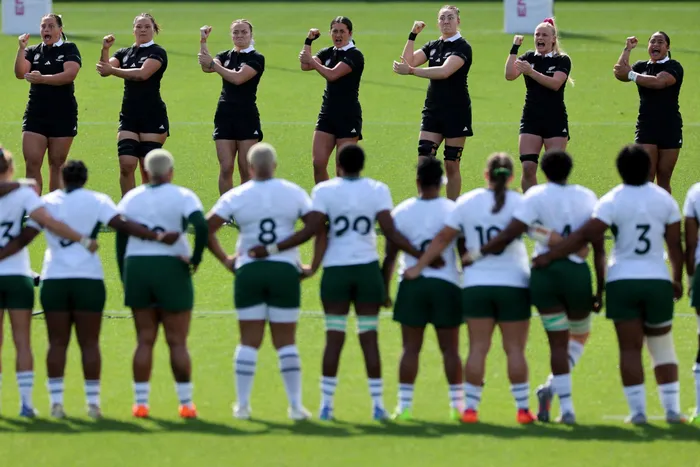Why South Africa must get girls playing rugby from an early age

New dawn: The Springbok Women face up to the haka before their Rugby World Cup quarter-final clash against the Black Ferns on Saturday. Photo: Adrian Dennis/AFP
Image: Adrian Dennis/AFP
The Springbok Women’s Rugby World Cup campaign has been hailed as a breakthrough moment for the sport in South Africa after they reached the quarter-finals for the first time in history.
After beating both Italy and Brazil in the pool stage to finish second behind France, the women in green and gold booked their maiden spot in the knockouts. Their run eventually ended against defending champions New Zealand, but they went down fighting – level with the world champions at half-time before the Black Ferns pulled away in the second half.
The performances have been described as the awakening of a sleeping giant in women’s rugby, and the sense is that South Africa’s women have finally announced themselves as a force on the global stage.
Rugby commentator and former player Layla Arrison, who previewed the tournament by predicting a quarter-final berth, said before the World Cup that the most important milestone would be winning a pool game. South Africa not only ticked that box but went further than ever before.
Get your news on the go, click here to join the IOL News WhatsApp channel.
“We’ve never won a game at a Rugby World Cup, so that will be the most important thing. I’ve also gone on air to say this will be the first time we reach the quarter-finals. We’ve never made it out of the group stages. If we can do that, we’re on a very exciting path,” she told IOL Sport before the tournament.
For much of South Africa’s post-isolation history, women’s rugby has been treated as the stepchild of the sport, with limited resources, shallow pathways, and little commercial support. But the past couple of years have brought signs of progress, with growing investment and sponsors beginning to see value in the women’s game.
Still, Arrison insists that the real transformation must come from the ground up. “We’re miles and miles behind [countries like New Zealand and England]. We are leap years behind where we should be, which is sad because we’re a rugby nation,” she said. “We need to have girls playing with a rugby ball at 6, 7, 8 years old, learning those finer skills, so that by the time they’re 19, they can sign a full-time contract for 10-plus years.”
Her dream is to one day see a women’s Craven Week, with schoolgirls given the same opportunities to shine as their male counterparts.
The Springbok Women’s World Cup campaign has proven what is possible when the right structures are put in place. For the players, it was a defining breakthrough; for the country, it was a glimpse of untapped potential. The hope now is that this run doesn’t stand as a one-off, but rather as the beginning of a new chapter that inspires the next generation of young girls to pick up the ball and carry South African rugby into a new era.
IOL Sport
Get your news on the go, click here to join the IOL News WhatsApp channel.
Related Topics: